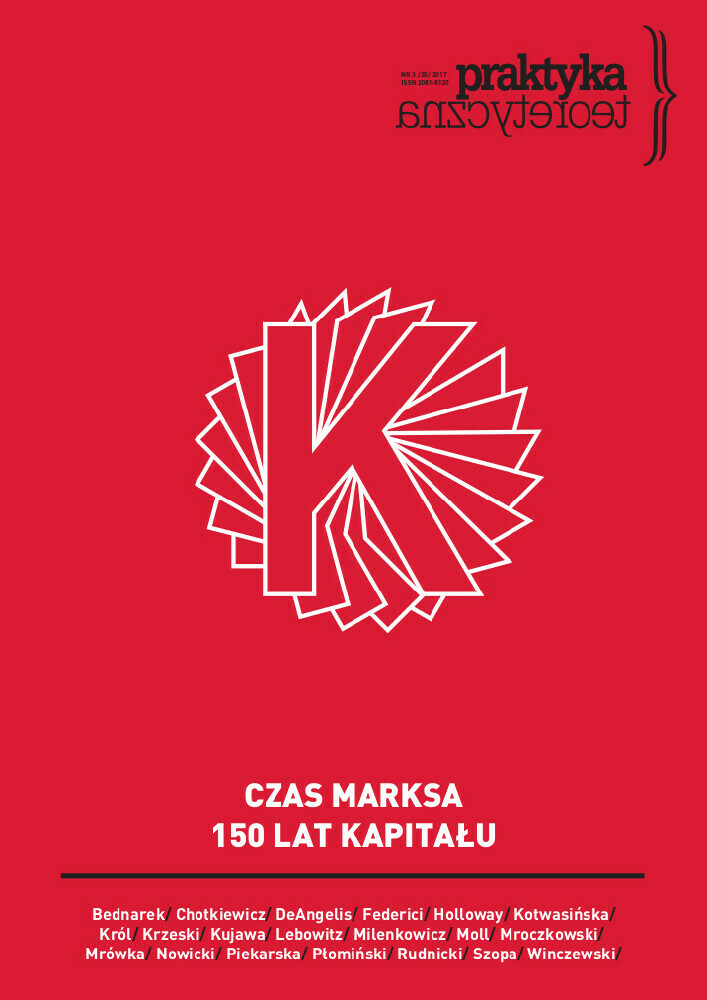Abstract
The article explores basic theoretical approaches of Félix Guattari, who was associated with La Borde clinic where the innovative methods of institutional therapy were created. Criticizing Freud and Lacan’s psychoanalysis, Guattari established non-traditional tools for treating individual and collective identities, as well as alternative means of perception for subjectivity production and group phantasm. At La Borde, Guattari, along with collaborators such as Frantz Fanon, developed the schizoanalytical method based on transversal relations and machinic unconsciousness, terms strictly related to the theoretical and philosophical assumptions of Anti-Oedipus.References
Berardi, Franco. 2008. Félix Guattari: Thought, Friendship and Visionary Cartography. Red., tłum. G. Mecchia, C. J. Stivale. London: Palgrave Macmillan.
Deleuze, Gilles. 2006. „For Félix”. Tłum. A. Hodges, M. Taormina. W Gilles Deleuze. Two Regimes of Madness. Texts and Interviews 1975–1995. Red. D. Lapoujade. New York: Semiotext(E).
Deleuze, Gilles. 2007. „Rozmowa o »L’Anti-OEdipe« (wspólnie z Feliksem Guattarim)”. Tłum. M. Herer. W Gilles Deleuze. Negocjacje 1972–1990. Wrocław: Wydawnictwo Naukowe Dolnośląskiej Szkoły Wyższej Edukacji TWP we Wrocławiu.
Deleuze, Gilles i Félix Guattari. 2000. Anti-Oedipus. Tłum. R. Hurley, M. Seem, H. R. Lane. Minneapolis: University of Minnesota Press.
Guattari, Félix. 1995. Chaosmosis. An Ethico-Aesthetic Paradigm. Tłum. P. Bains, J. Pefanis. Bloomington, Indianapolis: Indiana University Press.
Guattati, Félix. 2009. Chaosophy. Texts and Interviews 1972–1977. Red. S. Lotringer. Tłum. D. L. Street, J. Becker, T. Adkins. Los Angeles: Semiotext(E).
Guattari, Félix. 1984. Molecular Revolution. Psychiatry and Politics. Tłum. R. Sheed. London: Penguin.
Guattari, Félix. 2011. „Schizo Chaosmosis”. Tłum. A. Goffey. W The Guattari Effect. Red. E. Alliez, A. Goffey. New York: Continuum.
License
“Theoretical Practice” seeks to put into practice the idea of open access to knowledge and broadening the domain of the commons. It serves the development of science, thinking and critical reflection. The journal is published in open-access mode under the CC-BY-NC-SA 4.0 license (detail available here: http://creativecommons.org/licenses/by-nc-sa/4.0/). Articles published in the journal may be freely distributed, stored, printed and utilized for academic and teaching purposes without restrictions.
They should not be, however, used for any commercial purposes or be reconstructed into derivative creations. Access to the journal may not be limited or offered for a fee by any third party.
Prospective authors are obliged to fill in, sign and send back the publishing contract compliant with the CC licencing. [PL.pdf, PL.doc, EN.pdf,EN.doc].
According to this contract, authors grant the journal a non-exclusive right to publish their work under the creative commons license (CC-BY-NC-SA 4.0) without any financial obligation on both sides of the contract.
Before submission authors should make sure that derivative materials they use are not protected by copyright preventing their non-commercial publication. Authors are responsible for any respective copyright violations.
